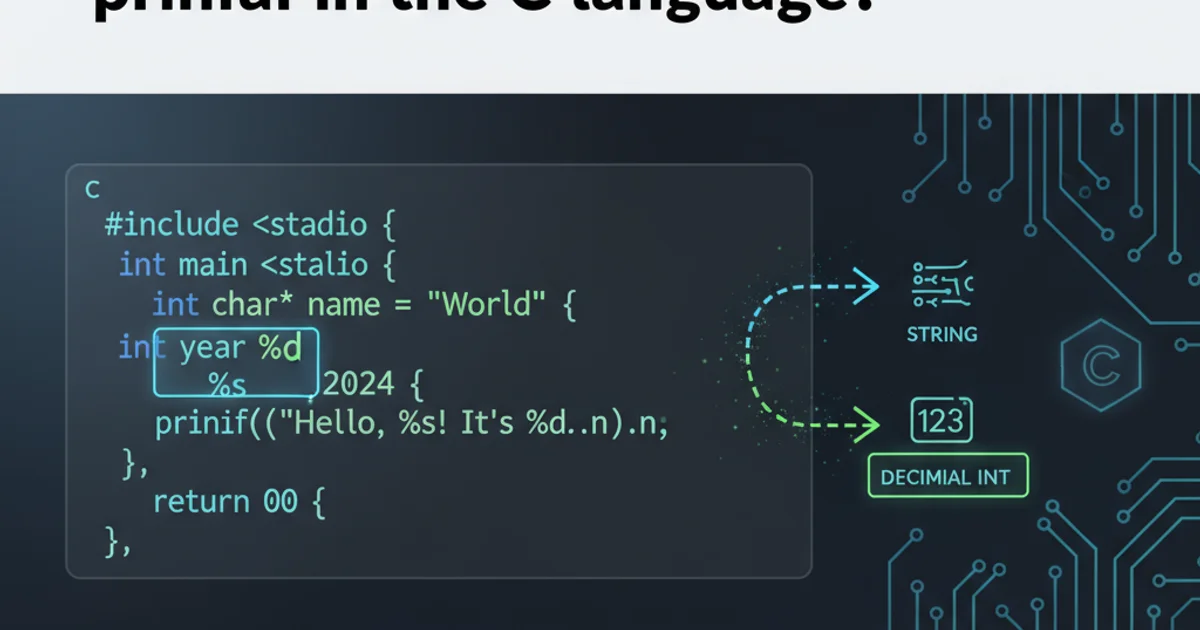What does %s and %d mean in printf in the C language?
Categories:
Understanding %s and %d in C's printf Function

Explore the fundamental format specifiers %s and %d in C's printf function, learning how to correctly display strings and integers in your programs.
The printf function in the C programming language is a powerful tool for formatted output to the console. At its core, printf relies on format specifiers to understand how to interpret and display the data you provide. Among the most common and essential specifiers are %s and %d. This article will demystify these two specifiers, explaining their purpose, correct usage, and common pitfalls.
The %d Format Specifier: Displaying Integers
The %d format specifier is used to print signed decimal integers. When printf encounters %d in its format string, it expects a corresponding integer argument and will convert that integer into its decimal string representation before printing it to standard output. This is crucial for displaying numerical results, loop counters, or any whole number data.
#include <stdio.h>
int main() {
int age = 30;
int year = 2023;
printf("My age is %d and the current year is %d.\n", age, year);
return 0;
}
Basic usage of the %d format specifier.
%d is for signed decimal integers, C offers other integer specifiers like %u for unsigned integers, %ld for long integers, and %lld for long long integers. Always match the specifier to the data type to avoid unexpected behavior.The %s Format Specifier: Displaying Strings
The %s format specifier is used to print strings. In C, a string is an array of characters terminated by a null character (\0). When printf encounters %s, it expects a pointer to the first character of a null-terminated string. It then prints characters from that memory location until it encounters the null terminator. This is fundamental for displaying text, names, messages, and any sequence of characters.
#include <stdio.h>
int main() {
char name[] = "Alice";
char greeting[] = "Hello, world!";
printf("Name: %s\n", name);
printf("%s\n", greeting);
return 0;
}
Basic usage of the %s format specifier.
%s with a non-null-terminated character array or a pointer that doesn't point to a valid string can lead to undefined behavior, including crashes or printing garbage data, as printf will continue reading memory until it finds a null byte.How printf Processes Format Specifiers
Understanding the internal mechanism of printf helps in appreciating why these specifiers are so important. When printf is called, it parses the format string from left to right. Upon encountering a % character, it looks for the next character to determine the type of data it needs to retrieve from the variable argument list. This process is sequential and relies on the order of specifiers matching the order of arguments.
flowchart TD
A[printf("Format String", args...)] --> B{Scan Format String}
B --> C{Found '%' character?}
C -- Yes --> D{Identify Specifier (e.g., %d, %s)}
D --> E[Retrieve Corresponding Argument]
E --> F[Convert Argument to String Representation]
F --> G[Print Converted String]
G --> B
C -- No --> H[Print Character]
H --> B
B -- End of String --> I[Finish]Flowchart illustrating how printf processes format specifiers.
The diagram above illustrates the basic flow. Each time a format specifier is found, printf consumes one argument from its variable argument list. If there's a mismatch between the specifier and the actual argument type, or if there are too few arguments for the specifiers provided, the behavior is undefined, often leading to incorrect output or program crashes.
Common Mistakes and Best Practices
Mismatched format specifiers are a frequent source of bugs in C programs. Always ensure that the type of the variable you are trying to print exactly matches the format specifier you are using. For example, using %d for a float or %s for an int will lead to incorrect output or runtime errors.
#include <stdio.h>
int main() {
int num = 123;
float pi = 3.14f;
char *message = "Hello";
// Correct usage
printf("Integer: %d, Float: %f, String: %s\n", num, pi, message);
// Incorrect usage (will lead to undefined behavior/warnings)
// printf("Integer as string: %s\n", num); // Mismatch: int vs string
// printf("String as integer: %d\n", message); // Mismatch: string vs int
return 0;
}
Demonstration of correct and incorrect format specifier usage.